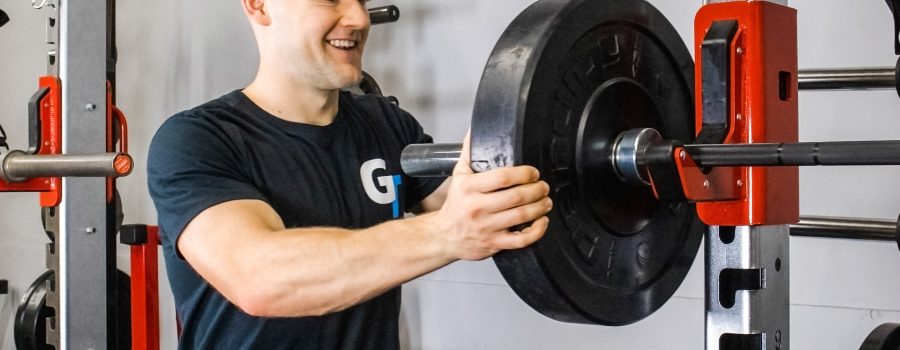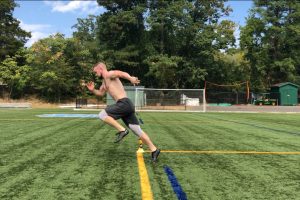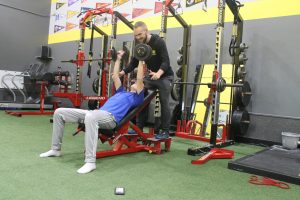Why You Struggle To Change
Here’s a little fun fact for you: All human action is done in an attempt to move away from discomfort. We are designed to deal with problems once they reach a point where the discomfort of not addressing them outweighs the energy required to actually make meaningful change to resolve it.
Inherently, we prioritize efficiency. Meaning that we don’t like to waste energy. Humans are animals after all. Our primary concern is to stay alive. Anything beyond that becomes a harder sell to our subconscious brains.
Essentially, our evolutionary lizard brain’s definition of survival and our modernly defined, pre-frontal cortex’s version of survival aren’t always the same thing.
For example, eating everything we can to pack on as much weight as possible makes sense to our subconscious brain, but dealing with the health problems, discomfort, and lack of physical ability that comes with obesity is not as desirable for our thinking brains.
Exercising to be healthier, feel better, and look good in a bathing suit can all be motivators for our conscious mind. But spending a bunch of energy and calories on “fake work” doesn’t make much sense to our evolutionary mind.
The problem is that without the buy-in from our deeper subconscious brain all effort that is derived from non-essential action driven by our thinking brain will be short lived. Sure we can watch some YouTube videos and get worked up to go for a run, but that cheap motivation won’t work to keep us in the habit for the months of consistent training required to make a substantial improvement.
Think about it like a human riding an elephant. The human (our pre-frontal cortex) has a little bit of influence about where the elephant (our deeper brain stem) goes, but in reality, the human is at the whim of the elephant.
While there are many avenues to address this, my favorite solution is to reframe things and create artificial pressures that arrange circumstances in such a way that the discomfort we are moving away from is actually making action toward a better outcome the intuitive and easiest choice.
People who are successful in their pursuit of health, athleticism, and wellness are those who make it part of their identity. Put another way, they simplify the daily actions required to be a healthy individual in such a way that movement, nutrition, sleep, and mindfulness are non-negotiable parts of their routine.
Here is the thing – change is oftentimes the hardest part. But once that change has been enacted, each subsequent action becomes easier. Eventually momentum builds, consistency becomes routine, and cumulative decisions stack to make significant wins.
However, the limiting factor in making that first change is the perception of overwhelm that comes with trying to do too much at once. Instead of remembering to take the first step on a hike, we tend to sit at the trail head feeling anxiety about how tall the mountain is.
But don’t feel bad. Making changes in our life is hard by definition. Anything that requires action outside of what our normal is requires an expansion of our comfort zone. And by definition, anything that moves us out of our zone of comfort is, well, uncomfortable.
So what do we do? Ignore. Procrastinate. Blame. Negotiate. Settle. And most commonly, we tell ourselves a story about how when circumstances change, we’ll somehow find motivation to act differently.
This leads to one of the biggest misconceptions we have about action; that we need to feel motivated before we can act differently.
One of my favorite books, The Subtle Art of Not Giving A F*ck by Mark Manson, spends time discussing this model very clearly. I’ll paraphrase for you here though I highly recommend the book.
The common mental pathway runs along the lines of Inspiration -> Motivation -> Action. Essentially, when we find inspiration through some external means, we will then draw motivation from that which leads to action.
Though this does happen from time to time, the resulting motivation is almost always cheap and short lived. In reality, the opposite is a much better representation of the process: Action -> Motivation -> Inspiration.
Put another way – Action is the basis of meaningful motivation in our lives. Action must come first.
If you want to lose weight, get out of pain, or gain strength, you can either wait until you’re sick, miserable, and at rock bottom for motivation to change OR you can take action toward a better outcome before that happens.
Waiting for something new to come into your life is likely just a short term adjustment to an uncomfortable symptom. This is not going to last.
Instead, by reframing and applying pressure on the situation you can artificially create the circumstances that move you into action. This can be investing money into a coach, making a bet with a friend, joining an accountability group, or literally anything that presents a reality that makes staying where you are more uncomfortable than that discomfort of change.
Investing a large sum into a coach or a bet makes a situation where natural risk aversion kicks in to avoid “wasting” the money. Similarly with bringing on an accountability group or signing up for a photo shoot, you introduce peer pressure and public shame in a positive way that makes a healthy eating pattern and daily movement seem much more enticing.
Once you have that discomfort set, you can then take action. That action will generate results. Those results will become motivation to continue. That motivation becomes inspiration about the bigger possibilities available to you.
Big takeaway here: Don’t just sit there, DO SOMETHING!
My challenge to you is to begin today with small wins that get this process started off.
- Drink 20 Ounces of water first thing in the morning.
- Get 7.5 quality hours of sleep at night.
- Walk for 20 Minutes outside after lunch
- Do a Daily 10 right after waking up.
- Read 10 Pages every day.
- Meditate for 10 Minutes.
- Cut out sugar on the week days.
- Do something that makes you sweat and gets your heart rate up.
- Practice a new physical skill.
- Eat at least 40 grams of protein at each meal.
It doesn’t matter which action you start with, but it does matter that you start. The journey of 1000 miles begins with a single step.
Don’t expect to condense an entire process into a single day, but know that by taking the first step, you have accomplished arguably the hardest part.
Which step will you take?




